Unit2 What time do you go to school ?SectionB 3a-selfcheck 课件
文档属性
| 名称 | Unit2 What time do you go to school ?SectionB 3a-selfcheck 课件 | 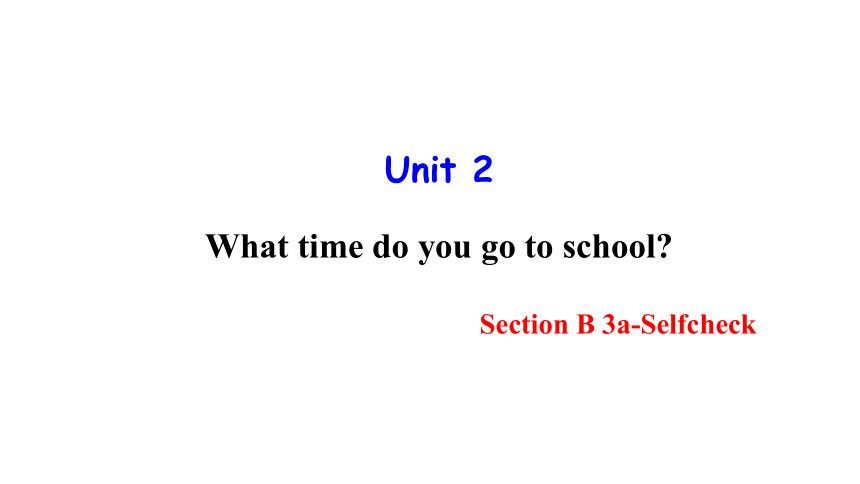 | |
| 格式 | pptx | ||
| 文件大小 | 1.3MB | ||
| 资源类型 | 试卷 | ||
| 版本资源 | 人教新目标(Go for it)版 | ||
| 科目 | 英语 | ||
| 更新时间 | 2022-02-28 15:25:18 | ||
图片预览

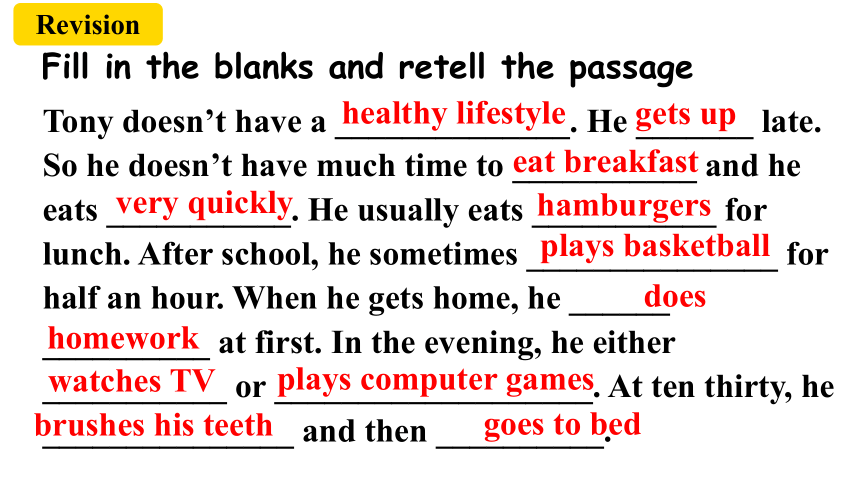
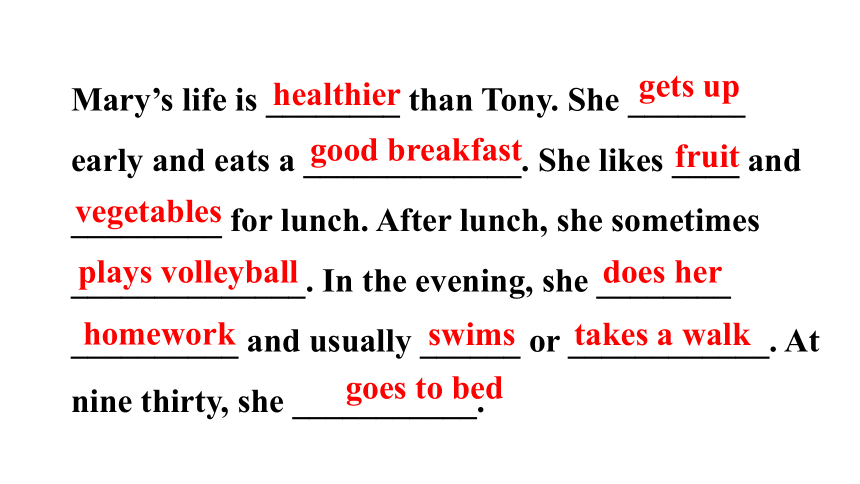
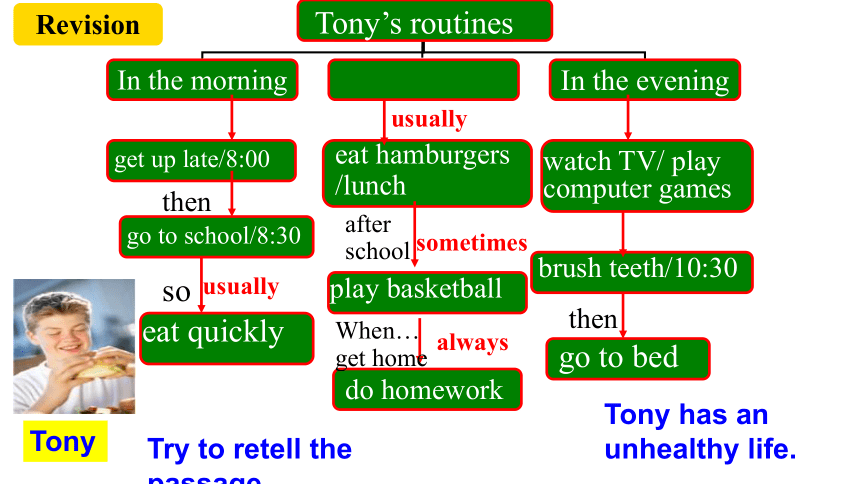
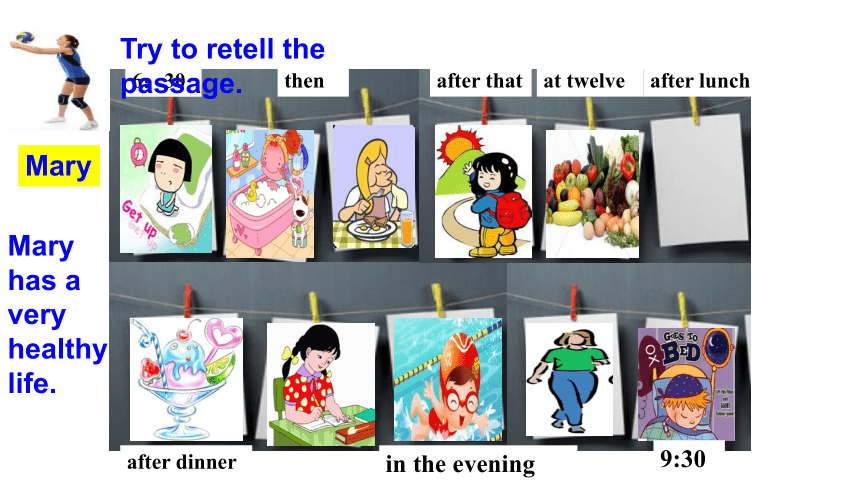
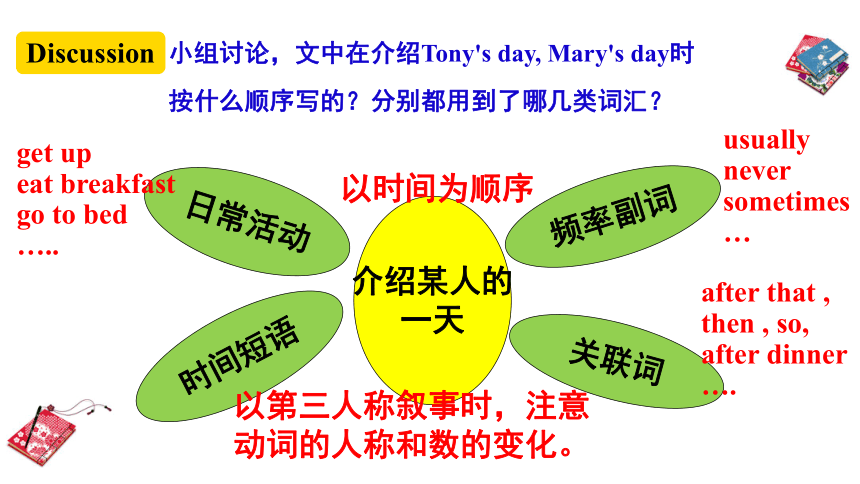
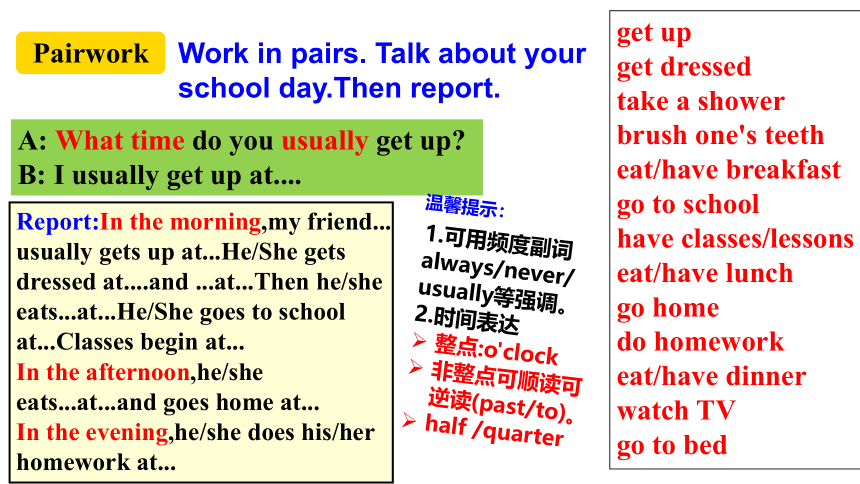
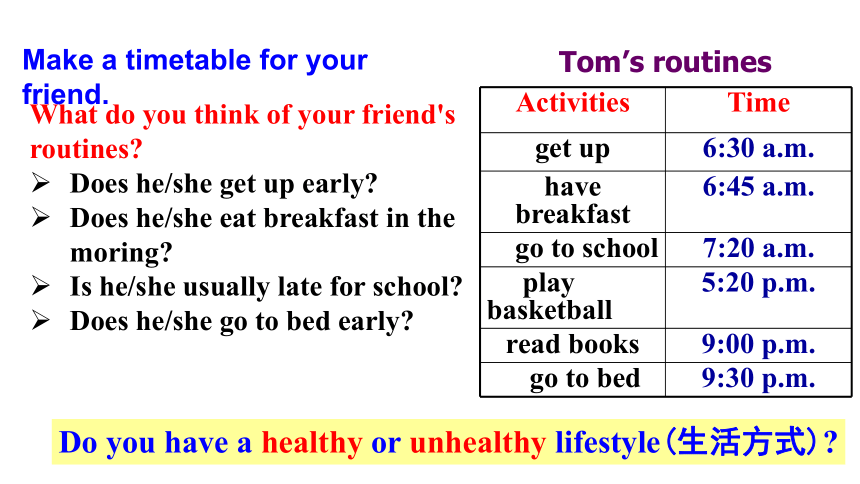
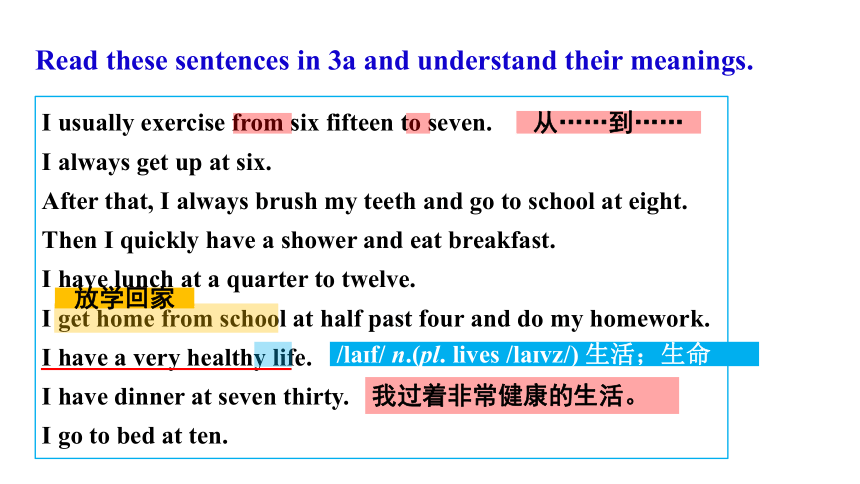
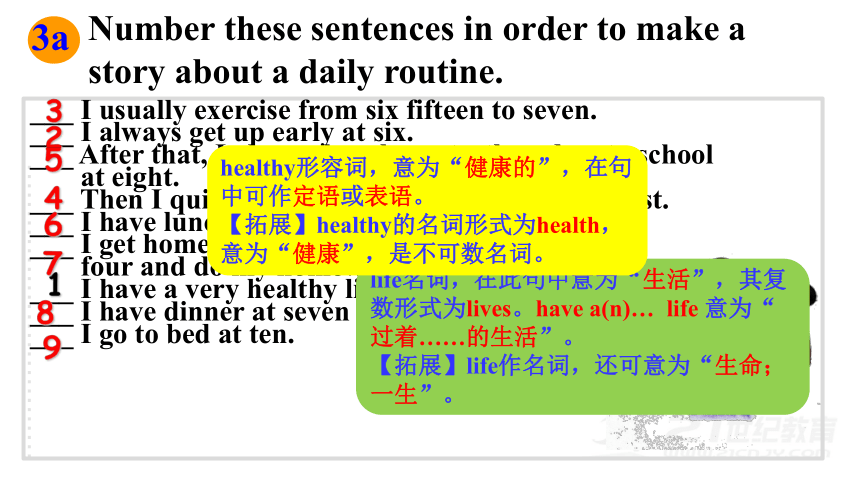
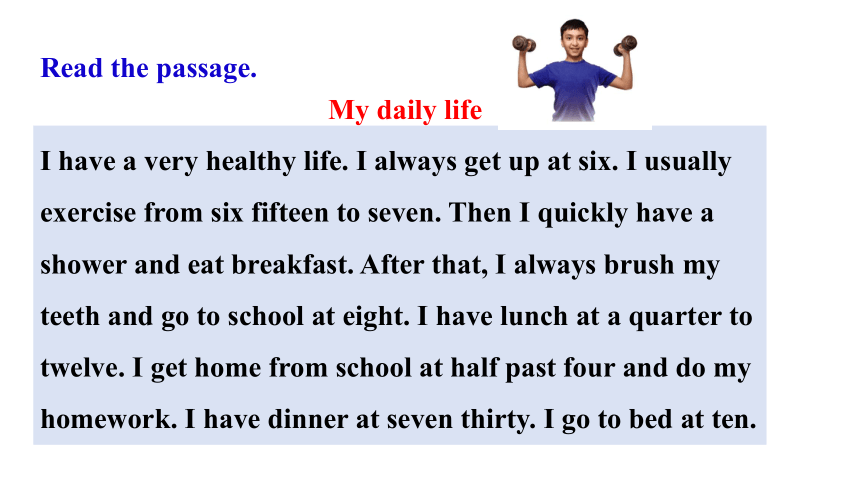
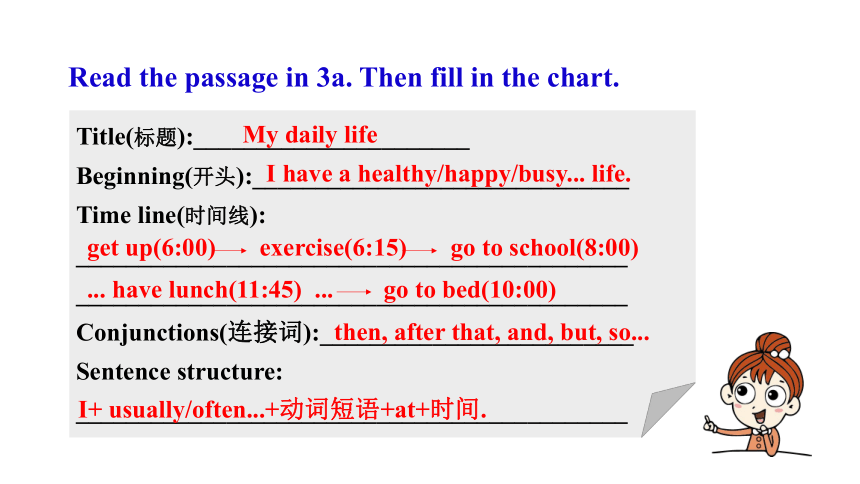
文档简介
(共42张PPT)
Unit 2
What time do you go to school
Section B 3a-Selfcheck
Tony doesn’t have a ______________. He _______ late. So he doesn’t have much time to ___________ and he eats ___________. He usually eats ___________ for lunch. After school, he sometimes _______________ for half an hour. When he gets home, he ______ __________ at first. In the evening, he either ___________ or ___________________. At ten thirty, he _______________ and then __________.
healthy lifestyle
gets up
eat breakfast
very quickly
hamburgers
plays basketball
does
watches TV
plays computer games
goes to bed
brushes his teeth
homework
Fill in the blanks and retell the passage
Revision
Mary’s life is ________ than Tony. She _______ early and eats a _____________. She likes ____ and _________ for lunch. After lunch, she sometimes ______________. In the evening, she ________
__________ and usually ______ or ____________. At nine thirty, she ___________.
healthier
gets up
homework
good breakfast
fruit
plays volleyball
does her
swims
takes a walk
goes to bed
vegetables
In the morning
In the evening
get up late/8:00
go to school/8:30
eat quickly
eat hamburgers
/lunch
play basketball
do homework
watch TV/ play computer games
brush teeth/10:30
go to bed
then
so
after
school
then
Tony’s routines
When…
get home
usually
usually
sometimes
always
Tony
Try to retell the passage.
Tony has an unhealthy life.
Revision
6:30
then
after that
at twelve
after lunch
after dinner
in the evening
9:30
Mary
Try to retell the passage.
Mary has a
very healthy life.
小组讨论,文中在介绍Tony's day, Mary's day时
按什么顺序写的?分别都用到了哪几类词汇?
日常活动
时间短语
频率副词
关联词
介绍某人的
一天
以时间为顺序
以第三人称叙事时,注意
动词的人称和数的变化。
usually
never
sometimes
…
after that ,
then , so,
after dinner
….
get up
eat breakfast
go to bed
…..
Discussion
get up
get dressed
take a shower
brush one's teeth
eat/have breakfast
go to school
have classes/lessons
eat/have lunch
go home
do homework
eat/have dinner
watch TV
go to bed
A: What time do you usually get up
B: I usually get up at....
Work in pairs. Talk about your school day.Then report.
Report:In the morning,my friend... usually gets up at...He/She gets dressed at....and ...at...Then he/she eats...at...He/She goes to school at...Classes begin at...
In the afternoon,he/she eats...at...and goes home at...
In the evening,he/she does his/her homework at...
温馨提示:
1.可用频度副词always/never/
usually等强调。
2.时间表达
整点:o'clock
非整点可顺读可逆读(past/to)。
half /quarter
Pairwork
What do you think of your friend's routines
Does he/she get up early
Does he/she eat breakfast in the moring
Is he/she usually late for school
Does he/she go to bed early
Make a timetable for your friend.
Activities Time
get up 6:30 a.m.
have breakfast 6:45 a.m.
go to school 7:20 a.m.
play basketball 5:20 p.m.
read books 9:00 p.m.
go to bed 9:30 p.m.
Tom’s routines
Do you have a healthy or unhealthy lifestyle(生活方式)
I usually exercise from six fifteen to seven.
I always get up at six.
After that, I always brush my teeth and go to school at eight.
Then I quickly have a shower and eat breakfast.
I have lunch at a quarter to twelve.
I get home from school at half past four and do my homework.
I have a very healthy life.
I have dinner at seven thirty.
I go to bed at ten.
Read these sentences in 3a and understand their meanings.
从……到……
/la f/ n.(pl. lives /la vz/) 生活;生命
我过着非常健康的生活。
放学回家
___ I usually exercise from six fifteen to seven.
___ I always get up early at six.
___ After that, I always brush my teeth and go to school
at eight.
___ Then I quickly have a shower and eat breakfast.
___ I have lunch at a quarter to twelve.
___ I get home from school at half past
four and do my homework.
___ I have a very healthy life.
___ I have dinner at seven thirty.
___ I go to bed at ten.
1
2
4
5
6
7
3
8
9
3a
Number these sentences in order to make a story about a daily routine.
life名词,在此句中意为“生活”,其复数形式为lives。have a(n)… life 意为“过着……的生活”。
【拓展】life作名词,还可意为“生命;一生”。
healthy形容词,意为“健康的”,在句中可作定语或表语。
【拓展】healthy的名词形式为health,意为“健康”,是不可数名词。
I have a very healthy life. I always get up at six. I usually exercise from six fifteen to seven. Then I quickly have a shower and eat breakfast. After that, I always brush my teeth and go to school at eight. I have lunch at a quarter to twelve. I get home from school at half past four and do my homework. I have dinner at seven thirty. I go to bed at ten.
Read the passage.
My daily life
Read the passage in 3a. Then fill in the chart.
Title(标题):______________________
Beginning(开头):______________________________
Time line(时间线):
____________________________________________
____________________________________________
Conjunctions(连接词):_________________________
Sentence structure: ____________________________________________
My daily life
I have a healthy/happy/busy... life.
get up(6:00) exercise(6:15) go to school(8:00)
... have lunch(11:45) ... go to bed(10:00)
then, after that, and, but, so...
I+ usually/often...+动词短语+at+时间.
【用法详解】(1)life在此处作名词,意为“生活”,have/live a(n)...life意为“过着……的生活”。
Now, we Chinese have/live a happy life. 现在,我们中国人过着幸福的生活。
Language points
(2)life作名词时,还可意为“生命;一生”,in one’s life 意为“在某人的一生中”。
My parents are the most important people in my life. 父母是我一生中最重要的人。
I have a very healthy life. 我过着非常健康的生活。(教材P12 3a)
3b
Write about you own daily routine.
________________________________________________________________________________________________________________________________________________________________________________________________________________________________________________________________________________________________________________________________________________________
______________________________________________________________________________________
______________________________________________________________________________________
审题 体裁 记叙文 话题 介绍日常活动
时态 一般现在时 人称 第一人称
段落 布局
开篇点题 This is my/a(an)...day.
描述一天的活动
上午: get up; eat my breakfast;
go to school; have classes
中午: eat lunch…
下午: go home; play basketball
晚上: do homework; go to bed
Writing guidance
素材准备
短语
get up 起床
take a shower 洗淋浴
get dressed 穿上衣服
brush teeth 刷牙
go home 回家
take a walk 散步
...
句子
1. I always…every day. 每天我总是……
2. I usually... at... 我通常在……
3. I often... at... 我经常在……
4. Sometimes I... at... 有时我在……
I have a very healthy life. I always get up at 6:00 and take a shower at 6:05 every day, I get dressed at 6:20 and eat breakfast at 6:25. I brush my teeth at 6:50 and go to school at 7:00. I have lunch with my classmates at 12:00. I usually go home at 4:00 and do my homework from 4:15 to 6:45. I always have dinner at 7:00 and take a walk with my family at 7:45. I usually watch TV at 9:00 and go to bed at 10:00.
Sample writing
My day
标题
对一天的整体概述
运用句型和短语,按时间顺序描述一天的活动
整体采用一般现在时态,第一人称
My Healthy Life
My name is Maria and I have a healthy life.
In the morning, I usually get up at 6:00. I get dressed at 6:10 and eat breakfast at 6:25.I also have a healthy eating habit. My favorite food is vegetables, fruit and milk. I like eating them for breakfast. I go to school at 7:00. I have lunch with my classmates at 12:00. After school, it's time for me to do my homework. After that, I have dinner at 7:00 and play tennis with my friends. At night, I always go to bed very early at 9:30.
I have a really relaxing school life. Do you think so What about your life
自我介绍(姓名年级学校等),点明主题
总结:adj.
互动结尾
内容:日程表
时间顺序
标题:大写首字母
Sample writing
1 Match the verbs in column A with the words in column B. Then use the phrases to complete the sentences.
taste
clean
have
get
take
brush
your teeth
my room
a walk
good
dressed
a good job
A B
Self Check
1. Ice-cream usually _____________, so students like to eat it after school.
2. My grandparents are very healthy. They always ___________ after dinner.
3. You need to _________________ after eating to have good teeth.
4. He _______________. He works at a radio station.
5. Here are your clothes. Go and ____________ quickly!
6. I don’t have time to ______________ from Monday to Friday. So I clean it on weekends.
tastes good
brush your teeth
take a walk
has a good job
get dressed
clean my room
2 Complete the conversations with the questions
and answers. Use the words in brackets to help you.
1. A:____________________________________
(your mother/usually/get up)
B:_____________________. (5:45)
A:____________________________
(why/get up/so early)
B:______________________________________.
(always/make breakfast for me)
What time does your mother usually get up
At a quarter to six
Why does she get up so early
Because she always makes breakfast for me
2.A:___________________________________
(you/usually/get to school)
B:_____________________________.
(7:30)
A:________________________________
____________________
(your class teacher/usually/get to school)
B: I don’t know. But he/she is never late for the
first class in the morning.
What time do you usually get to school
At half past seven
When does your class teacher
usually get to school
1. eat quickly 吃得快
quickly 副词,意为“很快地”,强调思维或动作快。其形容词为 quick,意为“快的”。
他跑得很快。
He runs very quickly.
他很快地完成了作业。
He does his homework quickly.
Summary:
(1)quick 的相关词:
quick adj.快的
slowly adv.缓慢地
quickly adv.很快地
slow adj.慢的
+ -ly
+ -ly
反义词
反义词
(2)形容词在词尾加 –ly 构成副词的还有:
sad 难过的
easy 容易的
quiet 安静的
happy 幸福的
sadly 难过地
easily 容易地
quietly 安静地happily 幸福地
+ -ly
2. After school, I sometimes play basketball for half an hour.
sometimes是副词,意为“有时”。
(=at times)
例:他有时和我哥哥一起踢足球。
He sometimes plays football with my brother.
辨析: sometimes, some times, sometime 与 some time
sometimes
频度副词,“有时”。
some times
名词短语,“很多次”
sometime
副词,“某个时间”
some time
名词短语,“一段时间”
巧记
“有时”相聚加“-s”(sometimes),
“几次”分开带“-s” (some times);
相聚为“某个时候” (sometime),
分开为“一段时间” (some time)。
1. I will go to Shanghai __________ next week.
2. __________ I get up very late.
3. I’ll stay here for __________ .
4. I have read the story __________.
sometime
Sometimes
some time
some times
3. In the evening, I either watch TV or play computer games.
either是副词, 意为“或者;也(用在否定句末) ”。
例:托尼也不会说中文。
Tony can’t speak Chinese, either.
例:你可以喝牛奶或者橙汁。
You can drink either milk or orange.
吉姆现在不是在教室就是在图书馆。
Jim is either in the classroom or in the library now.
他要么弹吉他,要么跳舞。
Either he plays the guitar or he dances.
(连接单词)
(连接短语)
(连接句子)
either …or …“要么……要么……;或者……或者……”,表示选择,连接两个并列的成分。
注意:either …or …连接两个主语时,遵循“就近原则”,即谓语动词应与最近的一个主语在人称和数上保持一致。
例:明天要么你帮助他,要么我帮助他。
Either you or I ____ him tomorrow.
help
4. At twelve, she eats lots of fruit and vegetables for lunch.
lots of意为“大量;许多”,后可接可数名词复数与不可数名词,只用于肯定句中。
同义短语:a lot of
辨析:lots of, much与many
lots of + 可数名词复数 /不可数名词
much +不可数名词
many +可数名词复数
5. She knows it’s not good for her, but it tastes good!
be good for
对……有益
be bad for
对……有害
+n./pron./doing
taste“尝起来”,后常接形容词作表语。
例:这种蛋糕尝起来的确美味可口。
The cake tastes really delicious.
拓展
(1)taste作实义动词,“品尝;尝”。
(2)taste作名词,“味道;滋味;品味”。
(3)类似的感官动词还有look, smell, sound,
feel等,分别为“看/闻/听/摸起来……”。
The green apples ______ delicious. Do you want one
A. eat B. drink
C. taste D. sound
按要求完成句子。
1. Her sister works in that hospital. (改为一般疑问句)
_______ her sister _______ in that hospital
2. When do you get up in the morning (改为同义句)
_______ _______ do you get up in the morning
3. I run at 7:00 in the afternoon.(对划线部分提问)
_______ _______ do you run in the afternoon
Does work
What time
What time
Exercise:
4. He gets up at seven in the morning.(改为否定句)
He _______ _______ up at seven in the morning.
5. Alice wants to know about my morning.(改为一般
疑问句)
_______ Alice _______ to know about your morning
doesn’t get
Does want
______ an hour is thirty minutes.
I think swimming is good _______.
Mr. Black always_______ to work,
About three _______ of my friends like English.
Amy wants to tell me something about her school_______.
二、根据句意,用方框中所给词的适当形式填空
Half
1
2
3
4
5
exercise
walks
quarters
life
walk life half exercise quarter
假设下表是Tom的日常生活时间表,请根据表格提示写一篇短文,介绍Tom的一天。
要求:1. 80词左右;
2. 可适当发挥。
Get up Have breakfast Go to school Have classes
time 6:40 7:10 7:40 8:00
Eat lunch Have classes Eat dinner Go to bed
time 12:00 14:00 17:50 21:30
Homework
Unit 2
What time do you go to school
Section B 3a-Selfcheck
Tony doesn’t have a ______________. He _______ late. So he doesn’t have much time to ___________ and he eats ___________. He usually eats ___________ for lunch. After school, he sometimes _______________ for half an hour. When he gets home, he ______ __________ at first. In the evening, he either ___________ or ___________________. At ten thirty, he _______________ and then __________.
healthy lifestyle
gets up
eat breakfast
very quickly
hamburgers
plays basketball
does
watches TV
plays computer games
goes to bed
brushes his teeth
homework
Fill in the blanks and retell the passage
Revision
Mary’s life is ________ than Tony. She _______ early and eats a _____________. She likes ____ and _________ for lunch. After lunch, she sometimes ______________. In the evening, she ________
__________ and usually ______ or ____________. At nine thirty, she ___________.
healthier
gets up
homework
good breakfast
fruit
plays volleyball
does her
swims
takes a walk
goes to bed
vegetables
In the morning
In the evening
get up late/8:00
go to school/8:30
eat quickly
eat hamburgers
/lunch
play basketball
do homework
watch TV/ play computer games
brush teeth/10:30
go to bed
then
so
after
school
then
Tony’s routines
When…
get home
usually
usually
sometimes
always
Tony
Try to retell the passage.
Tony has an unhealthy life.
Revision
6:30
then
after that
at twelve
after lunch
after dinner
in the evening
9:30
Mary
Try to retell the passage.
Mary has a
very healthy life.
小组讨论,文中在介绍Tony's day, Mary's day时
按什么顺序写的?分别都用到了哪几类词汇?
日常活动
时间短语
频率副词
关联词
介绍某人的
一天
以时间为顺序
以第三人称叙事时,注意
动词的人称和数的变化。
usually
never
sometimes
…
after that ,
then , so,
after dinner
….
get up
eat breakfast
go to bed
…..
Discussion
get up
get dressed
take a shower
brush one's teeth
eat/have breakfast
go to school
have classes/lessons
eat/have lunch
go home
do homework
eat/have dinner
watch TV
go to bed
A: What time do you usually get up
B: I usually get up at....
Work in pairs. Talk about your school day.Then report.
Report:In the morning,my friend... usually gets up at...He/She gets dressed at....and ...at...Then he/she eats...at...He/She goes to school at...Classes begin at...
In the afternoon,he/she eats...at...and goes home at...
In the evening,he/she does his/her homework at...
温馨提示:
1.可用频度副词always/never/
usually等强调。
2.时间表达
整点:o'clock
非整点可顺读可逆读(past/to)。
half /quarter
Pairwork
What do you think of your friend's routines
Does he/she get up early
Does he/she eat breakfast in the moring
Is he/she usually late for school
Does he/she go to bed early
Make a timetable for your friend.
Activities Time
get up 6:30 a.m.
have breakfast 6:45 a.m.
go to school 7:20 a.m.
play basketball 5:20 p.m.
read books 9:00 p.m.
go to bed 9:30 p.m.
Tom’s routines
Do you have a healthy or unhealthy lifestyle(生活方式)
I usually exercise from six fifteen to seven.
I always get up at six.
After that, I always brush my teeth and go to school at eight.
Then I quickly have a shower and eat breakfast.
I have lunch at a quarter to twelve.
I get home from school at half past four and do my homework.
I have a very healthy life.
I have dinner at seven thirty.
I go to bed at ten.
Read these sentences in 3a and understand their meanings.
从……到……
/la f/ n.(pl. lives /la vz/) 生活;生命
我过着非常健康的生活。
放学回家
___ I usually exercise from six fifteen to seven.
___ I always get up early at six.
___ After that, I always brush my teeth and go to school
at eight.
___ Then I quickly have a shower and eat breakfast.
___ I have lunch at a quarter to twelve.
___ I get home from school at half past
four and do my homework.
___ I have a very healthy life.
___ I have dinner at seven thirty.
___ I go to bed at ten.
1
2
4
5
6
7
3
8
9
3a
Number these sentences in order to make a story about a daily routine.
life名词,在此句中意为“生活”,其复数形式为lives。have a(n)… life 意为“过着……的生活”。
【拓展】life作名词,还可意为“生命;一生”。
healthy形容词,意为“健康的”,在句中可作定语或表语。
【拓展】healthy的名词形式为health,意为“健康”,是不可数名词。
I have a very healthy life. I always get up at six. I usually exercise from six fifteen to seven. Then I quickly have a shower and eat breakfast. After that, I always brush my teeth and go to school at eight. I have lunch at a quarter to twelve. I get home from school at half past four and do my homework. I have dinner at seven thirty. I go to bed at ten.
Read the passage.
My daily life
Read the passage in 3a. Then fill in the chart.
Title(标题):______________________
Beginning(开头):______________________________
Time line(时间线):
____________________________________________
____________________________________________
Conjunctions(连接词):_________________________
Sentence structure: ____________________________________________
My daily life
I have a healthy/happy/busy... life.
get up(6:00) exercise(6:15) go to school(8:00)
... have lunch(11:45) ... go to bed(10:00)
then, after that, and, but, so...
I+ usually/often...+动词短语+at+时间.
【用法详解】(1)life在此处作名词,意为“生活”,have/live a(n)...life意为“过着……的生活”。
Now, we Chinese have/live a happy life. 现在,我们中国人过着幸福的生活。
Language points
(2)life作名词时,还可意为“生命;一生”,in one’s life 意为“在某人的一生中”。
My parents are the most important people in my life. 父母是我一生中最重要的人。
I have a very healthy life. 我过着非常健康的生活。(教材P12 3a)
3b
Write about you own daily routine.
________________________________________________________________________________________________________________________________________________________________________________________________________________________________________________________________________________________________________________________________________________________
______________________________________________________________________________________
______________________________________________________________________________________
审题 体裁 记叙文 话题 介绍日常活动
时态 一般现在时 人称 第一人称
段落 布局
开篇点题 This is my/a(an)...day.
描述一天的活动
上午: get up; eat my breakfast;
go to school; have classes
中午: eat lunch…
下午: go home; play basketball
晚上: do homework; go to bed
Writing guidance
素材准备
短语
get up 起床
take a shower 洗淋浴
get dressed 穿上衣服
brush teeth 刷牙
go home 回家
take a walk 散步
...
句子
1. I always…every day. 每天我总是……
2. I usually... at... 我通常在……
3. I often... at... 我经常在……
4. Sometimes I... at... 有时我在……
I have a very healthy life. I always get up at 6:00 and take a shower at 6:05 every day, I get dressed at 6:20 and eat breakfast at 6:25. I brush my teeth at 6:50 and go to school at 7:00. I have lunch with my classmates at 12:00. I usually go home at 4:00 and do my homework from 4:15 to 6:45. I always have dinner at 7:00 and take a walk with my family at 7:45. I usually watch TV at 9:00 and go to bed at 10:00.
Sample writing
My day
标题
对一天的整体概述
运用句型和短语,按时间顺序描述一天的活动
整体采用一般现在时态,第一人称
My Healthy Life
My name is Maria and I have a healthy life.
In the morning, I usually get up at 6:00. I get dressed at 6:10 and eat breakfast at 6:25.I also have a healthy eating habit. My favorite food is vegetables, fruit and milk. I like eating them for breakfast. I go to school at 7:00. I have lunch with my classmates at 12:00. After school, it's time for me to do my homework. After that, I have dinner at 7:00 and play tennis with my friends. At night, I always go to bed very early at 9:30.
I have a really relaxing school life. Do you think so What about your life
自我介绍(姓名年级学校等),点明主题
总结:adj.
互动结尾
内容:日程表
时间顺序
标题:大写首字母
Sample writing
1 Match the verbs in column A with the words in column B. Then use the phrases to complete the sentences.
taste
clean
have
get
take
brush
your teeth
my room
a walk
good
dressed
a good job
A B
Self Check
1. Ice-cream usually _____________, so students like to eat it after school.
2. My grandparents are very healthy. They always ___________ after dinner.
3. You need to _________________ after eating to have good teeth.
4. He _______________. He works at a radio station.
5. Here are your clothes. Go and ____________ quickly!
6. I don’t have time to ______________ from Monday to Friday. So I clean it on weekends.
tastes good
brush your teeth
take a walk
has a good job
get dressed
clean my room
2 Complete the conversations with the questions
and answers. Use the words in brackets to help you.
1. A:____________________________________
(your mother/usually/get up)
B:_____________________. (5:45)
A:____________________________
(why/get up/so early)
B:______________________________________.
(always/make breakfast for me)
What time does your mother usually get up
At a quarter to six
Why does she get up so early
Because she always makes breakfast for me
2.A:___________________________________
(you/usually/get to school)
B:_____________________________.
(7:30)
A:________________________________
____________________
(your class teacher/usually/get to school)
B: I don’t know. But he/she is never late for the
first class in the morning.
What time do you usually get to school
At half past seven
When does your class teacher
usually get to school
1. eat quickly 吃得快
quickly 副词,意为“很快地”,强调思维或动作快。其形容词为 quick,意为“快的”。
他跑得很快。
He runs very quickly.
他很快地完成了作业。
He does his homework quickly.
Summary:
(1)quick 的相关词:
quick adj.快的
slowly adv.缓慢地
quickly adv.很快地
slow adj.慢的
+ -ly
+ -ly
反义词
反义词
(2)形容词在词尾加 –ly 构成副词的还有:
sad 难过的
easy 容易的
quiet 安静的
happy 幸福的
sadly 难过地
easily 容易地
quietly 安静地happily 幸福地
+ -ly
2. After school, I sometimes play basketball for half an hour.
sometimes是副词,意为“有时”。
(=at times)
例:他有时和我哥哥一起踢足球。
He sometimes plays football with my brother.
辨析: sometimes, some times, sometime 与 some time
sometimes
频度副词,“有时”。
some times
名词短语,“很多次”
sometime
副词,“某个时间”
some time
名词短语,“一段时间”
巧记
“有时”相聚加“-s”(sometimes),
“几次”分开带“-s” (some times);
相聚为“某个时候” (sometime),
分开为“一段时间” (some time)。
1. I will go to Shanghai __________ next week.
2. __________ I get up very late.
3. I’ll stay here for __________ .
4. I have read the story __________.
sometime
Sometimes
some time
some times
3. In the evening, I either watch TV or play computer games.
either是副词, 意为“或者;也(用在否定句末) ”。
例:托尼也不会说中文。
Tony can’t speak Chinese, either.
例:你可以喝牛奶或者橙汁。
You can drink either milk or orange.
吉姆现在不是在教室就是在图书馆。
Jim is either in the classroom or in the library now.
他要么弹吉他,要么跳舞。
Either he plays the guitar or he dances.
(连接单词)
(连接短语)
(连接句子)
either …or …“要么……要么……;或者……或者……”,表示选择,连接两个并列的成分。
注意:either …or …连接两个主语时,遵循“就近原则”,即谓语动词应与最近的一个主语在人称和数上保持一致。
例:明天要么你帮助他,要么我帮助他。
Either you or I ____ him tomorrow.
help
4. At twelve, she eats lots of fruit and vegetables for lunch.
lots of意为“大量;许多”,后可接可数名词复数与不可数名词,只用于肯定句中。
同义短语:a lot of
辨析:lots of, much与many
lots of + 可数名词复数 /不可数名词
much +不可数名词
many +可数名词复数
5. She knows it’s not good for her, but it tastes good!
be good for
对……有益
be bad for
对……有害
+n./pron./doing
taste“尝起来”,后常接形容词作表语。
例:这种蛋糕尝起来的确美味可口。
The cake tastes really delicious.
拓展
(1)taste作实义动词,“品尝;尝”。
(2)taste作名词,“味道;滋味;品味”。
(3)类似的感官动词还有look, smell, sound,
feel等,分别为“看/闻/听/摸起来……”。
The green apples ______ delicious. Do you want one
A. eat B. drink
C. taste D. sound
按要求完成句子。
1. Her sister works in that hospital. (改为一般疑问句)
_______ her sister _______ in that hospital
2. When do you get up in the morning (改为同义句)
_______ _______ do you get up in the morning
3. I run at 7:00 in the afternoon.(对划线部分提问)
_______ _______ do you run in the afternoon
Does work
What time
What time
Exercise:
4. He gets up at seven in the morning.(改为否定句)
He _______ _______ up at seven in the morning.
5. Alice wants to know about my morning.(改为一般
疑问句)
_______ Alice _______ to know about your morning
doesn’t get
Does want
______ an hour is thirty minutes.
I think swimming is good _______.
Mr. Black always_______ to work,
About three _______ of my friends like English.
Amy wants to tell me something about her school_______.
二、根据句意,用方框中所给词的适当形式填空
Half
1
2
3
4
5
exercise
walks
quarters
life
walk life half exercise quarter
假设下表是Tom的日常生活时间表,请根据表格提示写一篇短文,介绍Tom的一天。
要求:1. 80词左右;
2. 可适当发挥。
Get up Have breakfast Go to school Have classes
time 6:40 7:10 7:40 8:00
Eat lunch Have classes Eat dinner Go to bed
time 12:00 14:00 17:50 21:30
Homework
同课章节目录
- Unit 1 Can you play the guitar?
- Section A
- Section B
- Unit 2 What time do you go to school?
- Section A
- Section B
- Unit 3 How do you get to school?
- Section A
- Section B
- Unit 4 Don't eat in class.
- Section A
- Section B
- Unit 5 Why do you like pandas?
- Section A
- Section B
- Unit 6 I'm watching TV.
- Section A
- Section B
- Review of Units 1-6
- Unit 7 It's raining!
- Section A
- Section B
- Unit 8 Is there a post office near here?
- Section A
- Section B
- Unit 9 What does he look like?
- Section A
- Section B
- Unit 10 I'd like some noodles.
- Section A
- Section B
- Unit 11 How was your school trip?
- Section A
- Section B
- Unit 12 What did you do last weekend?
- Section A
- Section B
